Text
October 12th, 2022. La Habana. Matanzas.
Mis vidas —
Alas that I am once again late in my recounting and delayed in my writing! I have failed in my most solemn duty and shall endeavor to rectify my errors.
The past week has been a slow acclimatization to the renewed beginning of classes after the hurricane. The only disruption, besides the consistent issue of class discussions becoming too heated and rapid for us non-native speakers to effectively keep up, was the official university welcome on Wednesday, led by the cultural attaché to Cuba of the United States government. He remarked on the power of exchange programs and person-to-person contact and asked to be joined to the students' group chat, a request which we all, in silent concord, promptly ignored. Far more interesting to me was his fairly low level of Spanish, which I had not entirely expected; in general, however, kept myself quite contained considering my usual attitudes towards agents of US foreign policy, particularly in relation to Cuba. Since the event was later televised, I have concluded that it was a wise choice not to bring up the embargo when he asked us students about our experiences.
My nightlife continues to flourish; our Malecón walks have become regular, though we most often use them to entertain political arguments and debates on far more silly topics. My neighbors, it appears, have entirely the wrong opinions of various novels and the characters within them.
On Saturday, we began our trip to Matanzas, a province and city just east of Habana. We began with a tour of the Castillo de San Severino, a structure built in the 18th century by the Spanish to protect the coast against pirates, then later used as a prison, and ultimately as a museum, acknowledging its role in the slave trade and its related atrocities. Its exhibits on the Orisha and the particularly Yoruba influence on modern Cuban religion was absolutely fascinating.
On a more humiliating personal note, the Castillo is also the location of my most absurd mistake. My loves, it is true: I locked myself into the bathroom for struggling to move the heavy metal bolt with my freshly washed hands, and remained caught until the metal and my hands alike had dried fully.
After a shared lunch, we visited AfroAtenas, a wonderful community project that aims to preserve the long-standing cultural heritage of Matanzas while working for economic betterment and greater opportunities. As part of the project, we were taken to a brightly painted alley and allowed to see a performance by their children's dance group, followed by a lecture on drums and the importance of their work; it was truly a lovely experience.
Finally, we retreated to a restaurant and waited for several hours, whiling away our time with games and conversation. Much was revealed by all involved. The night itself was somewhat miserable: the electricity was gone, so we all slept in the thick heat.
The next morning, we went on a hike in the Varahicacos nature preserve. All beautiful, certainly, but there is no doubt the best part was the shallow cave system, broken up by enough overhead holes to let in light, yet still cool enough to house sleeping bats.
The afternoon, as any visit to Matanzas inevitably demands, was spent in Varadero, the most well-loved beach area of Cuba. I spent much of my time wandering the sands or sharing a coconut with my friends, but I certainly cannot complain about seeing my most beloved ocean once more. Besides, the conversation both here and in the bus continued to be lively; I may yet get attached to yet another language.
Since Monday was a national holiday — the beginning of the Wars of Independence occurred October 10th — I accomplished but little, going to Habana Vieja once more in vain search for glasses for one of our party, who had been on the lookout for weeks.
Today was mostly spent in a viciously competitive line for ballet tickets, in which I was the last person who was able to buy tickets for the day, but I did get them!
Con amor,
MICHA.

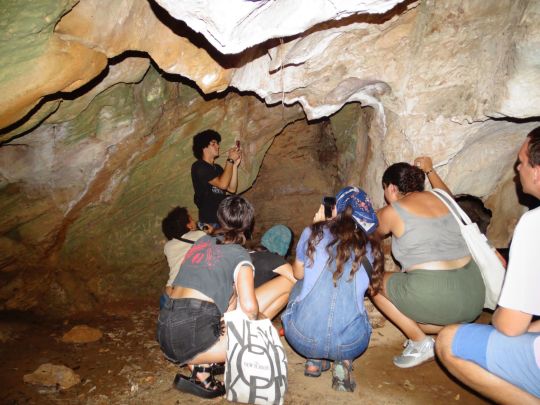


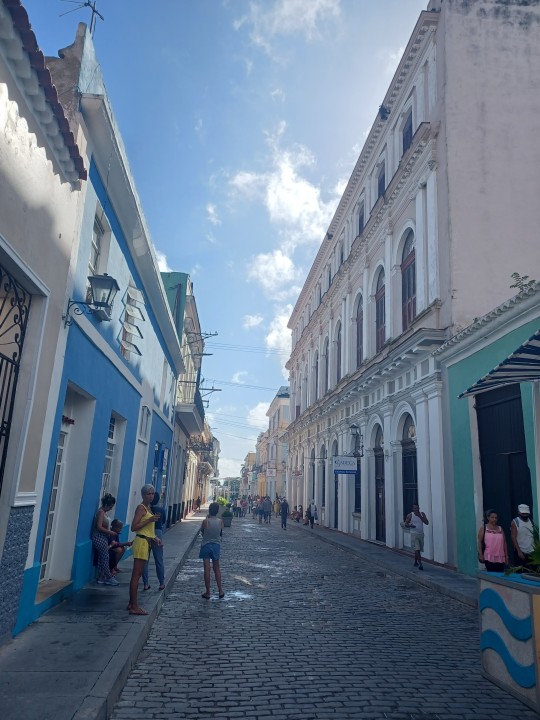
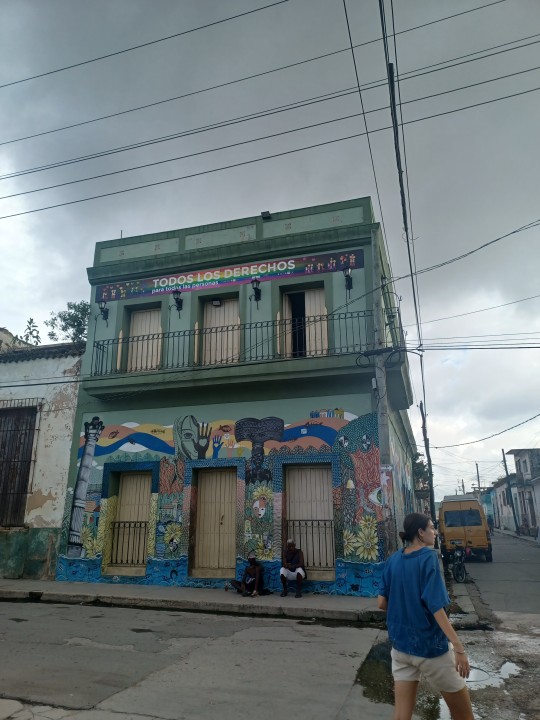
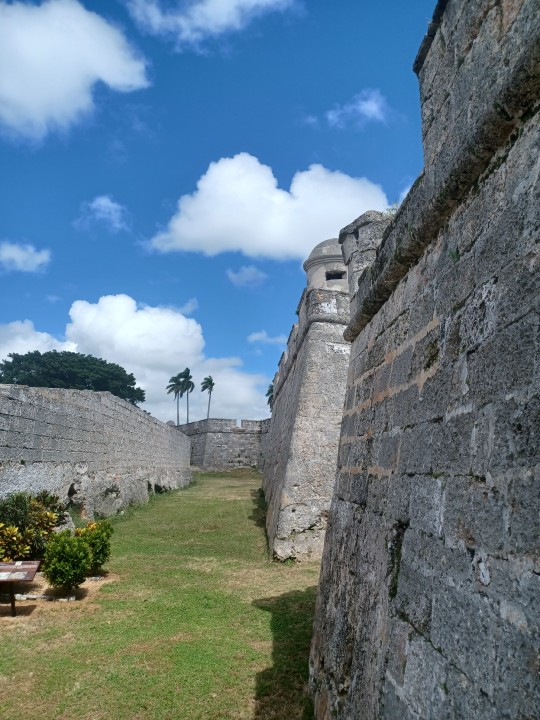
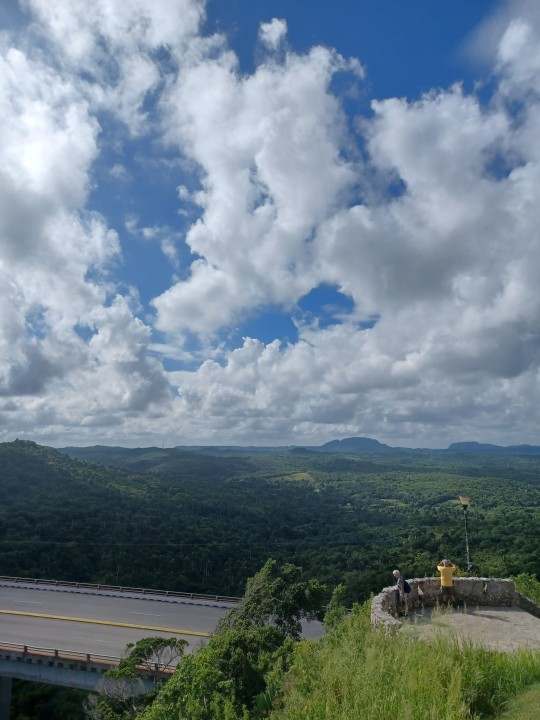
0 notes
Text
October 1st, 2022. La Habana.
Amigos mios —
It has been a while since you have heard from me, so I shall endeavor to relay all of my recent adventures with accuracy, although the past week entire has become somewhat of a homogenous blend in my own memory.
On Monday, as you may recall, classes were cancelled in preparation for the upcoming hurricane; it was hardly necessary, for the day was calm and even the ocean, which we visited often, remained quite still. An occasional gust of wind toyed with the palm leaves, but it was hardly more than usual. Nevertheless, I enjoyed my free time, spending much of it reading or knitting.
On Tuesday, Hurricane Ian passed over the western provinces of Cuba, hitting Pinar del Río, the Isla de la Juventud, and Artemisa especially hard. We, safely sheltered in Habana, experienced but little of its fury. Even so! The storm was a thing of wonder. You, knowing so well my fondness and affinity for storms, will not be surprised to learn that I spent much of the day sitting on my windowsill, watching the powerful wind crosshatch the driving rain, rattle the roof, throw shingles against walls, and cut palm leaves into ribboned shreds. Around noon, the electricity disappeared; a reasonable precaution entirely given the sheer number of trees freshly fallen across power lines and posts yanked out of their firmament. Though my program director called to forbid my leaving the house, I accompanied my host mother to the corner store to buy bread from far shorter lines than could be found anywhere outside of a hurricane. Certainly well worth it for the stunning view of the sunset and the wonderfully refreshing chilliness of the cool night air.
Wednesday marked the beginning of the week's bucket baths; with the loss of electricity came, too, the loss of running water in the household. My host grandmother took me on a walk around the neighborhood, primarily to watch the magnificently tall waves crash well over the Malecón and batter the nearest streets, storm drains running over in their desperate attempts to contain the incomparable ofean. Otherwise it was hardly remarkable, save for our first coconut adventure: we had gotten sufficiently bored, and further inspired by Russian tourists attempting to open a coconut against a lamppost, to go searching for green coconuts and the water inside. Our search on the ground for fallen coconuts proved fruitless, as did my friends' attempts at knocking down coconuts by tossing rocks in their general direction; but finally, just as we were about to give up, we found coconut palms low enough for me to climb and pull down two. We were quite thoroughly mocked by the Cubans who saw us, although that is perfectly understandable; nearly a dozen foreigners banging a rock against a coconut in the style of the early hominids is certainly entertaining. The drinking of the coconut water occurred very rapidly, since it was running out of the coconuts from several ends, but I would argue that it was well worth it. That night, with the hope of electricity flickering on a short stretch of the Malecón, we started our habit of extended nighttime walks. J and C delighted in explaining to me the sheer percentage of students who skimmed or never properly read their assigned readings; apparently neither of them had ever finished a reading all the way. It seems I could have achieved extraordinarily similar results for far less effort all along. I expect they shall attempt to further bother me with such stories.
Thursday marked our collective descent into extended card games. We met at the park and accomplished little else all day. We were taught Secret Hitler, which was an instant hit despite the high levels of betrayal; we played round after round of BS; and we learned Presidents. That afternoon, however, we also met at the office for a short salsa lesson that taught us all the basic steps. It was enormously fun; my only minor complaint is that it was also awfully gendered, aided little by the fact that the split in our program is equal. I remain a rather poor follow.
An interesting note is that the protests against the lack of electricity began occurring here; we heard about them vaguely from our host parents, but clearly saw the effects in the markedly high presence of police cars and the lack of data at night, shut off by the government in an attempt to prevent organization.
Besides even more card games, Friday involved my host family taking me out to a lovely and delicious restaurants and an extended group Malecón sit involving — and here you may be much shocked, my loves — even more cards. We also had our second coconut adventure! We happened upon a coconut in the road; it was kicked and snapped open neatly, so we all descended upon the road coconut and consumed it quite handily. Alas that we did not have better tools to break it open further; I cut the corners of my mouth open on the outer shell.
Saturday was dedicated to quests, since several of our party wished to acquire a certain kind of beer they had seen somewhere. We ventured into the city, stopping at various cafes and garage sales along the way, and, though we missed the sale initially, eventually found ourselves at yet another café, where we sat down and played yet more cards. (The original beer quest proved rather unsuccessful. Fourty dollars a case, it seems, is not worth it.) Ultimately, we did end up back at the Malecón; truly the appeal of the ocean calling to us is irresistible. I learned much of the tolerance of others that night.
And today we set forth to quest once more, this time to Habana Vieja to find some jewelry. Once again, I did not quest anything myself, but I did spend a wonderful afternoon in this fair city.
Finally, dear friends: I remain, as ever, so proud of my sisters, from those learning to walk (and climb! lest we forget) to those accepted to prestigious zine fairs. May they enjoy all their endeavors!
Besos,
MICHA.




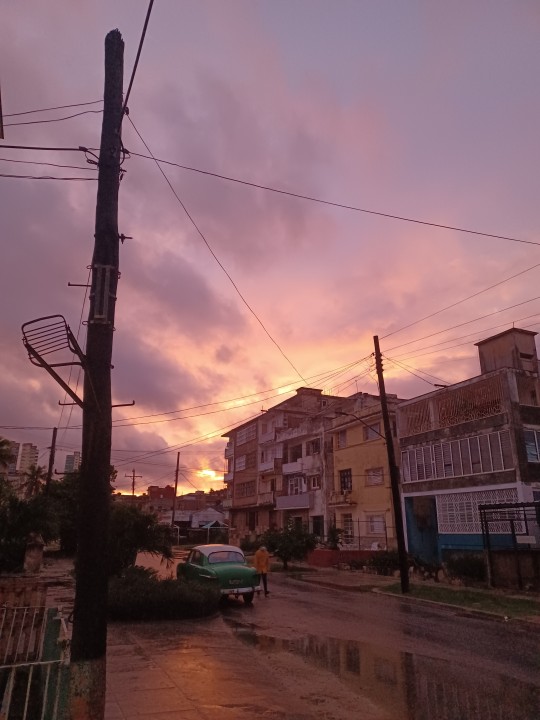

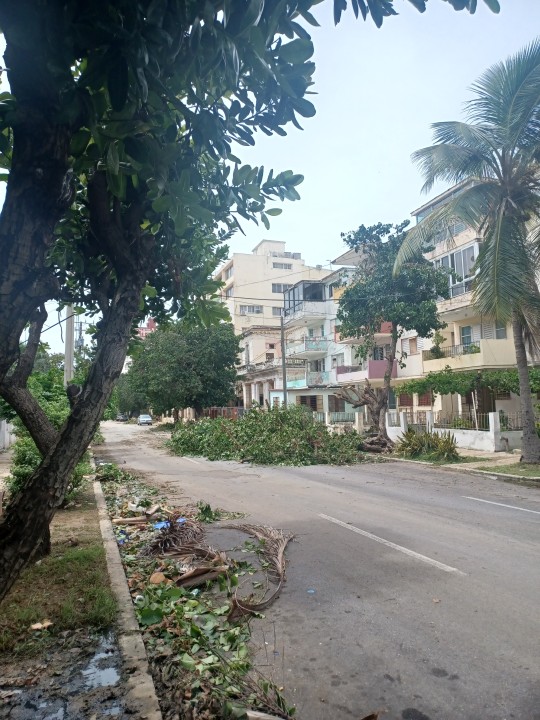


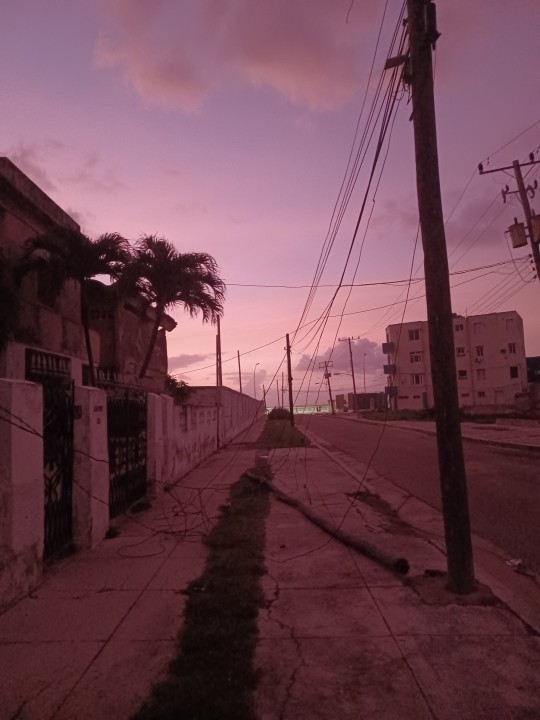
1 note
·
View note
Text
September 25th, 2022. La Habana.
Mis corazones —
The days pass like sand through my fingers here, a blurry haze of lazy mornings, bright sunshine, and pleasant company. After class on Friday, we wandered around together before finding a restaurant to celebrate the birthday of one of our company. Accompanied by quite excellent Lebanese food, we spent a pleasant evening together; and afterwards, on the Malecón, shared the pleasure of ten students trying to figure out how to light a birthday cigar. Ultimately, they resorted to consulting our excellent mutual friend Google, but it was far more entertaining to watch than I had ever expected.
On Saturday, upon finally purchasing a permanent phone line, I walked to Habana Vieja, taking advantage of sexism and male company to avoid the otherwise endless conversations with people intending to sell me their wares. I spent much of my time recording posters and signs for the Código, though I did manage to call my family and learned that my youngest of sisters has begun to walk. What wonderful news!
Today, however, I once again met with my dearest love. She is changeable, as is her wont; in fact, with the coming hurricane, her waves are growing and her turbulence is deepening. Yet on the fine white sands, she is gentle, soft against my skin, and warmer than I have ever encountered her before. Her breeze leaves my lips pleasantly salty. And there is nothing to interrupt the blue expanse, ranging from a deep midnight blue to a sandy white, save for filmy wisps of cloud. Truly there is but little that can compare to the wonderful beauty of the ocean!
On our walk back, we were further blessed by the freshness of a gathering storm, likely thanks to the hurricane that will pass over the island for the next few days, in addition to the notice of cancelled classes for most of this week. As destructive of a reminder of the ocean's power they are, storms, too, share her incalculable beauty.
Once home, I got drawn into another conversation about the Código, this time by my host great-aunt and great-grandfather. At 89, he voted yes without any hesitation; she, technically residing in Spain when not caring for her father, did not get to vote, but did take time to lecture me on the importance of respecting all people, leaving women alone even if they are unaccompanied in public, and the rights of trans individuals. Let it be known I heartily agreed to all of her points. Though by no means representative of the entire society — certainly, university students are of quite the same views as at home — it is interesting that in my host family, age seems to be directly correlated with support for the Código. The great-grandfather voted yes without question; the grandmother generally seemed to view it positively; the mother was conflicted; the teenager openly identified himself as homophobic. At least here, this response is also fairly directly linked to support for the government, which is as fascinating in itself as it is in combination with the Código.
Kisses to you all!
MICHA.
PS. The sun, however, could never be so kind nor so beautiful as my beloved ocean. I am crispy.


0 notes
Text
September 22nd, 2022. La Habana.
Mis compañeros —
Once again I return to you with both repetitive daily routines and, at least to me, with my own specific set of priorities, significant events.
Classes continue to occur; I am now considering dropping both Sociología de las Migraciones and Historia de la Cultura Cubana, since they are adding but little to my educational goals here, and I spent more time than I would have liked checking the time during class. During the Cuban culture class, I was once again asked whether I love the American flag, with the obvious expectation that I say yes and move on. It was rather a shock to announce that I neither identify with the United States nor have a great love for any flag, nor indeed any nation. The other classes are still moving at a rapid pace, but I remain hopeful that I will understand and be able to participate effectively.
Otherwise, much of my time has been spent arguing about politics. Last night, during an unplanned apagón, my neighbors and I went on an extended walk along the Malecón once more. We have somewhat differing approaches to the state, the political system, and the nation; yet after tonight, I am inclined to argue that our fundamentals views are quite similar, and our disagreements are more about how and by what means to achieve our relatively shared ideals.
Tonight, the debate was far more contentious; I am rather proud of myself for maintaining a smiling, cheery face the entire time, despite the wide variety of quite disagreeable opinions expressed.
At dinner, my host mother notified me of the ongoing kitchen discussion between my host grandmother and my host father on the código de las familias; knowing my investment both in politics and in the family code, she invited me to join. And join I did!
They began with a discussion of the flaws of the family code: that it granted too much power to changeable children and adolescents, who would now no longer obey their parents; that it granted too much power to the state, including the military, over children, when it should have been a parents' right; that it made it more difficult to raise children. My host mother, ever the diplomat, pointed out the benefits of protecting the elderly, of protecting children from abuse, of protecting the gays; yet she too opposed the reframing of parental authority to parental responsibility and the autonomy legally granted to children. When her daughter and her boyfriend came in, they too were asked their opinion; she abstained from the discussion as quickly as possible, but he remained a firm no vote due to the apparent prioritization of state over parental power related to children and the codification of same-sex marriage. My host mother asked him if he was a homophobe, saying it was no longer acceptable in these times; his answer as to whether he was a homophobe was a simple acquiescence. Apparently, for him, it was quite simple: men were created for women and women for men. My host mother here chimed in that she liked the anti-discrimination protection of the new code, but opposed, too, the teaching of queerness as normal to children; she brought in the Bible here, the perfect unity of the reproductive pair, and argued that adults could make whatever choice they wanted and have it be respected, but not force children to consider it normal. Apparently one of the classic Cuban cartoons recently featured an episode where an iconic mambisa hero nearly kissed a coronel, which was ridiculed by everyone present. I am nearly grateful to years of family dinners in my own childhood and adolescence preparing me to not show any reaction besides a smile and thoughtful nods.
From there, the conversation meandered slowly to the US; apparently my host father is a strong Trumpista and quite genuinely positions him as one of his idols, just behind Fidel Castro and Vladimir Putin. Luckily, this was an argument I was somewhat more emotionally prepared to handle, and I like to think I made some good points myself, though I must admit that defending Biden is not a position I enjoy finding myself in. It is, unfortunately, extraordinarily difficult to argue with that firm a conviction; if there is a way to effectively change pro-Trump minds, I have not yet found it.
And then, finally, the argument devolved into one about the Ukrainian war. My loves, you know that I have never in my life looked fondly upon Russia; you know I was born not 100km from Ukraine; you know it is a topic I have significant personal investment in, not to mention the family members and family friends directly affected by the war. Similarly my host grandmother: her daughter and grandchild live just outside of Kyiv, and though her passport is Russian she was born in Ukraine to a Ukrainian mother and a Ukrainian heart. My host father, however, in keeping with his idolization of Putin, fully supports Russia and sees Ukraine as a victim of American interests, ignoring Ukraine's own long history of intense nationalism and tension with Russia. At some point he went so far as to say that Russia was the victim, and that Ukraine was fundamentally the same thing as Russia; it is one of my least favorite lines of argumentation, and I joined my host grandmother in defense of the distinction. At this point, he was fairly inebriated, though all adults had had something to drink, so there was a lot of pro-Putin yelling involved.
According to him, I am still very young and influenced heavily by the university; I will apparently change my mind as I grow and gather experience. I can only hope that I shall never be so inflexible as to reject change; yet I also hope to remain firm to my ideological convictions and never fall to idolizing authoritarians whatever the human cost.
Tomorrow, almost out of spite, I shall attend the rally for the Código, and I shan't tell my host family a single word about it.
Queerly yours,
MICHA.

2 notes
·
View notes
Text
September 20th, 2022. La Habana.
Mis amores —
And so the days begin to blur together, and time fails to pass in crystal-clear moments but becomes, instead, the comfort of cotidianidad. I would not bore you with repetitive details, but I did have some new experiences.
Yesterday was noteworthy primarily for the fact that I was able to participate in class more than once, rather than only reeling from the rapidity of complex information exchange in what is ultimately still a foreign language. I am still not quite familiar with what professors want from their students in the way that I am at home, but I write in full hopes of approaching that knowledge ultimately.
In far more exciting news, I skipped class today (I know, loves. It is certainly not characteristic) in order to attend a panel on the Código de las Familias, with a variety of experts speaking on the topic. Perhaps most prominent was Mariela Castro, niece of Fidel and founder of CENESEX, the center for sex education and simultaneously the hub of national government-linked queer activism with activities ranging from research and policy development to rallies and movie nights. Perhaps the most fascinating part of her speech was her framing of the opposition; like my friend, she is convinced of the social media influence of outside anti-communist mercenaries. She went so far as to posit that the Catholic Church was particularly opposed to the Código primarily due to its anti-communist sentiments, even if she did not negate the role of its own conservative doctrines entirely.
I discussed this further with my program leaders; she pointed out the social and political power of other evangelical churches, though you will all be familiar with the fact that they do not share in my burning and singular research interest of religious institutions. I also spent some time yesterday wandering around the city, taking pictures of the signs and posters advocating for the Código. It must look silly to anyone passing by, but it is just fascinating to document. If only I could access the news! Suffice it to say that I am quite excited for this coming Sunday.
Los quiero,
MICHA.
0 notes
Text
September 18th, 2022. La Habana.
Mis vistas —
This morning, I met up once more with my friend L, so we could visit the Centro Fidel Castro. As per his wishes, there are neither monuments bor streets named after him, so this center provides the focal point of public dedication to his life and works. The museum, in a restorated colonial mansion, is quite beautiful, and technologically quite advanced. Most fascinating to me, however, is the tone of near hero worship the museum grants him — a hero of the Revolution, a military genius, a political savior, humble throughout, devoted to the people, and kind as summer, if the museum is to be believed. It is not an approach to historical figures that I am over-fond of, nor even particularly comfortable with, but it was certainly interesting to see the heavily rose-tinted lenses used by the museum and plenty of its visitors. No mention of his less savory political activities, nor his more questionable economic choices, nor his personal life, nor even his military failures, of which any professor of history will acknowledge there were plenty.
We also discussed the Código de la Familia; there was a public show of support on the Malecón yesterday, and I mourn having missed it. According to L, the opposition is primarily funded by the evangelical hard right in the US — and while I have few doubts about their international efforts, and their strong desire to meddle in Cuban politics, I am hard-pressed to believe that Cuba does not have its own share of social conservatives.
We also discussed the topic at home, over lunch: my host mother and grandmother have a somewhat more realistic view, acknowledging the machismo still existing in the society. They also informed me that voting is mandatory here, often arbitrary, and that nobody wants to be a local representative, since it entails a high volume of demands and a low level of functionable power.
The afternoon I whiled away in parks, first with others from the group, knitting while they painted, and then with family and friends over video call. While hardly productive, it was deeply gratifying.
Finally, I spent a good two hours talking to my host great-aunt. I learned that she actually lives in Madrid; she is only here to take care of her elderly father after her mother passed. I also learned that her parents were very nearly on opposite sides of the Revolution; her father was a peasant, while her mother's family was Spanish and owned great tracts of land. In fact, they met during the agrarian reform of the 60s, when he was tasked to redistribute her family land. I was so enthralled I nearly missed dinner.
With all blessings,
Your loving
MICHA.
0 notes
Text
September 17th, 2022. La Habana.
Mis flores —
What a wonderful day I have spent today! We drove out early im the morning to Las Terrazas, a community built by the government in the 70s in an attempt to combine reforestation and rural development. It is in the Sierra del Rosario, aptly named for its beautiful string of little mountains; its views are truly unbeatable. It is incredible that most of this nature reserve and research station is but fairly recently reforested. The lushness of its forest would certainly belie the fact.
We began our journey at the cafetal Buena Vista, a partially restored French coffee plantation. The plantation itself is a place laden with tragedy and historical atrocity; it cannot be diminished, nor can it be ignored. The mountains, however, and the soaring vultures drawing free-wheeling circles before swooping just over our heads and landing, wings outstretched, on the sunny rocks, were indescribable.
We went to a tiny museum next, dedicated to the guajiro natural, Polo Montañez, a talented musician of the local community. I am certain to look up his music afterward; from what we heard, it tends to be sweetly tragic and eminently danceable.
After an extensive and truly delicious lunch, we went to the river. Oh, friends — you know that I do not often enjoy swimming, but the shallow pools, little eddies, and rocky waterfalls of the river were truly a wader's delight, while my more aquatically inclined companions could at the same time enjoy the deeper basins. I could have spent hours wandering there, with water between my feet, fish sprinkled with stripes and spots scattering at my approach, and vine-roped trees providing the most pleasant of shades.
Ultimately, though, I held no regrets in leaving that enchanting river — we visited artisans next, and the most incredible of these was a family of beekeepers. Beekeeping is plenty incredible by itself, but these bees are something else entirely. They are called abejas de la tierra, or abejas meliponas. They live in small colonies with a guard ever on duty. They build hexagonal cells only for their eggs, preferring a set of tunnels that resemble nothing so much as a castle. The honey they produce is somewhat acidic, with medicinal properties, and the pollen they turn nearly fully into that most acidic of vitamins is just as delicious as their golden-amber honey, which we sucked right out of the tunnels with a straw. And, crucially, they do not sting — they do not even possess stingers, in fact. What incredible little animals! What wonderful creatures!
On our return journey, we saw once more the fury of the tropical rain, with old cars barely driving through lagoons that rose halfway up their wheels. For us, in our large van, the rain remained but a gentle lulling sound, bathing the entire landscape in a calm grey.
Be(e)sos,
MICHA.
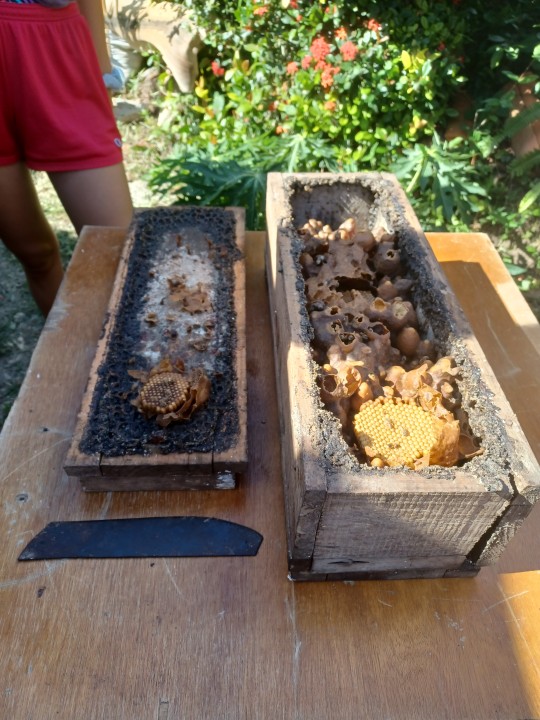
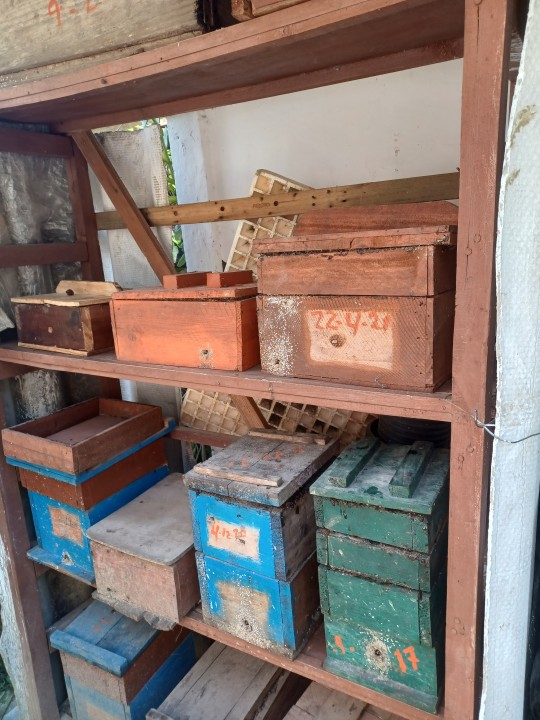
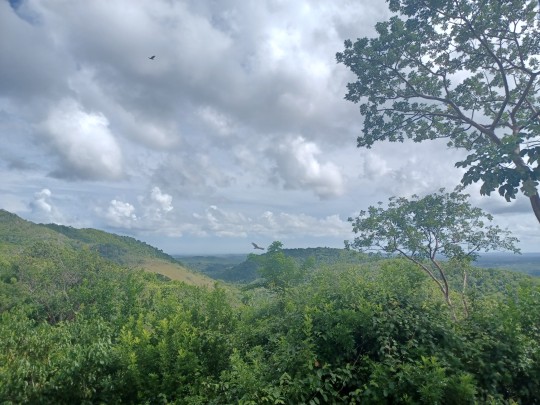
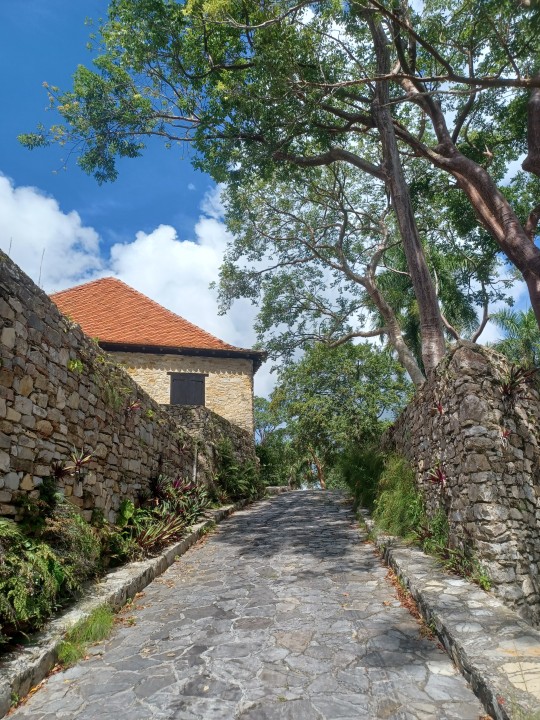

1 note
·
View note
Text
September 16th, 2022. La Habana.
Mis queridas —
I went on yet another oceanside walk today; it is aa fortifying for my health as it is enthralling for my soul. I am become quite willing to bear even the scorching heat of the midday sun for her beauty.
My only class of the day was Panorama de la Cultura Cubana, my strongly recommended easy class. Given its easiness, my subsequent ability to comprehend and participate in every moment, and the generally awful side of my personality that emerges when I can safely push back, I spent most of my time arguing with the professor, over inconsequential and more important things alike. From last class, we are continuing our debate on sociology, which he holds to be less important and less valid than anthropology. I, of course, have not taken a single sociology class before Cuba, nor do I find myself strongly attached to the discipline, yet in the context of this class I will defend it to the death. We discussed, too, food scarcity in the US; the possibility of an individual culture existing; and which qualities I prefer in a boyfriend, to which I — in my absolute commitment to honesty and also being a little shit — answered nada. I could not resist following it up with the claim that I am too focused on my studies to be looking for a novio, entirely straight faced. (Pardon the joke, my dear friends.) Luckily, the professor seems to be enjoying this kind of participation, so I need not even feel much guilt.
As a group, we went to get ice cream at a store near the university after class. At 150 pesos for two large scoops and excellent quality, I am near certain to return; and besides, it waa good to learn more about my fellow group members. I am slowly gathering evidence for certain suspicions.
After a more formal advising meeting, we continued to coalesce over coffee, which does not cease to be delightful. I must remind myself to purchase some before I leave.
Tomorrow we go to Las Terrazas! I am quite excited to see the natural wonders of Cuba outside of La Habana.
Con amor,
MICHA.
1 note
·
View note
Text
September 15th, 2022. La Habana.
Mis vidas —
I have little to report in terms of classes; I had but one today, and Historia de la Revolución Cubana was much the same as always. We learned, however, that our final will be merely to write a paper connecting our lived experiences in Cuba to the class content, a paper of any length we desire. He seems to be expecting no more than two to four pages, which is certainly achievable.
I took two of my group members home with me; my host mother had offered to change money and acquire the much-desired foreign currency while the students eagerly took the chance to avoid the interminable bank lines. It was a lovely time, and I felt a strange sort of pride for my host house and my host family, despite not being personally responsible for either. I suppose the formation of attachments must start somewhere.
After a brief advising meeting with the program coordinator, I cannot say I am more equipped to make final decisions on my classes. The coordinator suggested asking to audit without doing any of the papers, which seems absolutely foolish to me; what is the point of auditing if not to take a class as usual but without the limits of official matriculation? She also felt it necessary, in the face of my apparently obvious independence, to remind me that I should not walk alone at night. A wrench in some of my plans, perhaps, but that is alright.
A group of us also chose to attend a theater performance, supposedly part of a diversity exhibition with a tenuous relationship to existence; it seems to happen at strange hours, if at all, and nobody entirely knows where its components are. The theater performance was an extended one-woman monologue with occasional guitar, a litany of complaints about being an actress and dashed childhood hopes, complete with an affected drinking habit. It was interesting, though I must admit it is not my favorite kind of theater.
Far more interestingly, we met one of our Cuban classmates at the event and struck up a conversation. We began with American politics; he follows it closely, supports Bernie Sanders and Alexandria Ocasio Cortez, and is deeply disturbed by the electoral system. He told us that he is a strong communist and that it was up to us, as the youth and future of the United States, to make radical changes. He promised to give us Marxist literature next time he saw us, though all of us had read much of it already.
(His response to a question on Cuban democracy was that it was — in theory — far fairer and more democratic, though he also openly acknowledged the flaws of the current system.)
The conversation then turned to cultural interests, which would have been fascinating had I been able to hear anything. Alas, the social justice rap concert occurring directly next to us left hearing him a distant possibility. As such, he resorted to googling various musicians from the US on his phone, from Elvis Presley to Lil Nas X (and Maroon 5, yet again. It seems disproportionately popular here), showing it to us, and waiting for us to nod or shake our heads depending on our knowledge and enjoyment of his chosen artists. He also offered his drink for all of us to try, which we did. If nothing else, we have at least made another contact, even if he does spend much of his time attempting to convince us to radicalize the youth in the US.
The ocean and its impending storm is still perhaps the most enchanting thing I have ever seen.
Con amor,
MICHA.
0 notes
Text
September 14th, 2022.
Mis conciudadanos —
Today I had perhaps the strangest class experience I have ever had. I entered Historia de la Cultura Cubana this morning with the expectation that we would pick up where we had left off last week, with a definition of culture from various theorists. No, my friends, we had a new professor today, and what a character he is. On one hand, his deepest wish is to inspire his students, to let them write poetry, to think, to live. He told us stories — the boy kissing the butterfly, the golden bird from the near-dead sycamore, the tree drawings, the tigers and the strawberried — talked at length about the power of culture and literature to connect across borders and express the deepest emptions of humanity, told us that we all had a thousand souls within us and the best way to see that was through looking at each other's eyes, and even wrote CARPE DIEM on the board in massive letters. It is obvious that he believes firmly in culture as a transformative means, in the priority of love, in human connection as primary to building peace. His impassioned speeches nearly had the students clapping in their seats.
And yet. Yet. Simultaneously, somehow, he is the source of some of the strangest things I have heard professors say, here or at home. The anti-telephone discussion was expected; it fits with his teaching style and personal philosophy alike. One of his lectures purported to explain the reason men always looked at women's nalgas, their rears. According to him, it is an evolutionary instinct left over from monkey signals used to identify females in heat. Men are particularly sensitive because they have tunnel vision while women have far greater peripheral vision; relatedly, women were always looking at others, and one should not ask their histories lest they lie or you regret the asking. Besides falling into biological determinism and stereotypes, he was simply wrong in this, but it seemed to be accepted without outward trouble. He also made several jokes involving the active use of slurs, which was once again remarkable to see coming from a professor.
Sociología de las Migraciones is a far more usual class, though it once again pointed to the one of the strange little quirks of Cuban universities: if one participates sufficiently in class, the professor can and will cancel the final for that person. Though not perhaps of much help to me here, I know I would have loved such an arrangement at home.
I am certain you shall all be very pleased to know that in my wanderings yesterday, I found yet another copy of The Hobbit, this one in Spanish, and could not resist purchasing it for a mere 300 CUP. I have at this point amassed a somewhat large collection of Hobbit copies, but it continues to be such a strange and wonderful little book — and besides, each of my copies is a separate edition.
In the evening, after yet another bout of rain, I went on a lovely extended ocean walk along the Malecón with one of my program neighbors. Though the conversation would get somewhat stuck inevitably, as is often the case with new people, we eventually found ourselves in a riveting extended conversation on lawns, a most fascinating of subjects. We also found a very small friend!
Abrazos,
MICHA.

1 note
·
View note
Text
September 13th, 2022. La Habana.
My darlings —
Yet more frustrating internet experiences today. Apparently my phone hardly wishes to stay connected. Nevertheless! We continue.
In Sociología de Género, we once again went over definitions of gender and the sex-gender system. (Greetings to Gayle Rubin! Ever since reading her more controversial articles, I cannot think of her the same way.) I am almost certain to continue with this class, as it is both interesting and comfortably familiar. Historia de la Revolución Cubana was wonderful as always; since the professor has so far failed to assign us homework, the class functions as a very engaging storytime where the professor dramatically re-tells the major events of the Revolution.
I did not do much in the afternoon besides enjoying the rain, but my evening was quite entertaining. It was my host grandmother's 69th birthday, and so we held a lovely birthday dinner with her, one of her Russian friends, my host mother, and myself. As with all classic Soviet celebrations, the vodka was free-flowing; the three women went through nearly an entire bottle by themselves. As our program forbids the host families from serving us alcohol, I was luckily not made responsible for more than a small shot in a large glass of tomato juice. Later, I was made tea to participate in the toasts, which was far more entertaining. Nostalgic, they talked plenty about life in the Soviet Union and life in Cuba as it used to be — and, when my host father briefly joined us, told me about the various difficulties in acquiring even the most basic things. This despite the program prohibition on discussing politics, which seems entirely silly to me. Why remove one of our most interesting and available sources of information on Cuban life?? Rice, beans, and oil are available; fruits and vegetables can be purchased on the market quite cheaply; all other things, however, from cheese and meat and milk to backpacks and shoes and clothes require specialized knowledge and significantly higher prices to acquire. I am lucky my host mother is so talented in procuring all necessities, for my stay here could have looked extremely different. Yet they could not end the conversation without bringing up the pride of Cubans: their education and their doctors, both of which are free and recognized around the world as being of extremely high quality. They seem the very areas the United States, for instance, fails most miserably with.
Un brindis a ustedes,
MICHA.
0 notes
Text
September 12th, 2022. La Habana.
Mis queridas —
I spent a most wonderful morning yesterday, wandering the three miles or so along the Malecón all the way to La Habana Vieja. (What I was doing there remains irrelevant. I shall argue, of course, that it was in pursuit of scientific research; but it cannot be denied that a less logical curiosity was involved.)
I was waylaid on my journey back by an elderly man, who evidently stopped me in order to complain about the current state of affairs. This was an interesting change from the others who have tried to stop me as an obvious tourist — typically, they are trying to sell me tours or souvenirs. He told me he is a construction worker, but surviving off of income sent by family from the United States; he told me about the dangers of the old buildings, which frequently risk collapse, and their contrast to the shiny new hotels the government invests in for the sake of tourism; he told me again about the scarcity of medicine, and of milk; of government lies, spread to others through tour guides that made Habana all pretty and glossed over its problems; of problems of youth work, exacerbated by racism, and alcoholism, and prostitution. Interestingly, he blamed all of the social ills on the current government. He spoke no ill of Castro, and in fact argued that this would never have happened under Castro — perhaps not strictly true from a political science perspective, as the current situation is certainly influenced by Castro's policies and legacy, but nonetheless a fascinating view into the power of national symbols, the revolutionary hero Castro among them. It was also a good reminder that, for all its beauty and all its advantages, Cuba is not a utopia and its people suffer frequently. La Habana, too, is just as much crowded lines waiting for bread and heaping piles of rancid garbage and buildings crumbling under their own weight as it is free university and historic architecture and incredible medical advances.
I spent much of the rest of the afternoon doing my readings, for my classes are many and my decisions no further.
Today, my first class was on Estructuras & Desigualdades. The professor, taking mercy on us in the relentless heat, held class outdoors and later released us early before cancelling the Thursday class. She clearly prioritizes student well-being above university norms, and it is something I deeply appreciate. My next class was three hours of Teoría e Ideología de la Revolución Cubana. I maintain that I am woefully underqualified for the class — not simply in terms of understanding the rapid Spanish in a context where a dozen philosophy majors are talking at the same time, but also in the lack of cultural and historic context that the other students share and can easily refer to. Unfortunately, as the only exchange student who remained in this class, my pride obliges me to continue attending. And besides, the class is interesting and the other students are warming ti me, sharing explanations and cheek kisses alike.
My other class, as of late, has been Arabic, in a desperate attempt to keep up with my university peers. As it turns out, I may have planned too much for myself, especially with the limited resources I have access to, but I trust that all shall be well.
Besos,
MICHA.

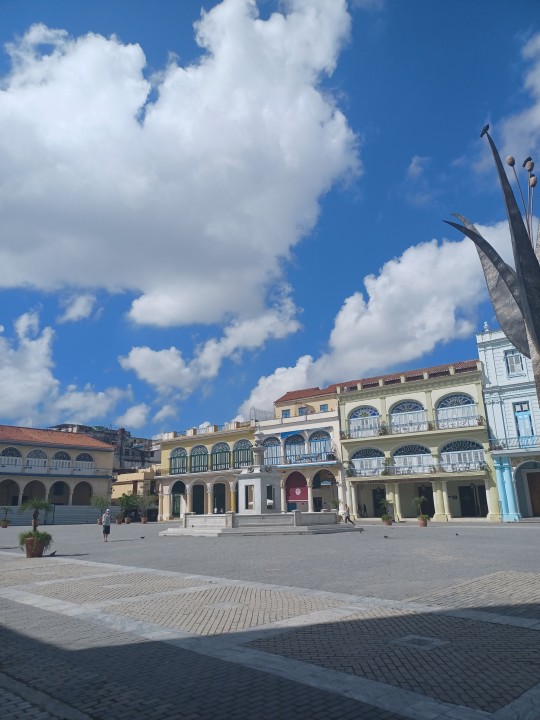
1 note
·
View note
Text
September 10th, 2022. La Habana.
Amigos mios —
Yesterday I made the decision to attend a Panorama of Cuban Culture class in the Spanish faculty for non-Spanish speakers rather than my otherwise scheduled 19th century history class. This panorama class is simultaneously quite easy, with slow speaking and clearly low expectations for the amount of work we have to do, and quite entertaining, with regular field trips as part of its curriculum. Unfortunately, however, my intellectualism complex may not permit me, out of sheer stubbornness, to take a class where the final is but a page and a short oral presentation. Additionally, I have caught the professor being wrong more than once — sometimes semi-jokingly, such as when he described Cuba as a matriarchy and a paragon of queer acceptance, and sometimes quite seriously. (The annexionist movement of the 19th century, for instance, did not view the US as a haven of democracy. Rather, the slavery-dependent sugar bourgeoisie viewed entrance into the United States and especially the South as a way to secure the continued legality of slavery in the face of English and French abolitionist pressure and Spanish and Cuban instability on the matter. If I have been doing anything, it has been keeping up with my history readings!) I am unsure of what classes I will continue to take; I counted, during our group meeting, and I have attended eleven separate classes. I may only choose four to six of these, depending on their credit load.
Also yesterday, our group went to a student union-organized outdoor concert. (Well. Beforehand we went to a bar. As it turns out, even small amounts of wine are quite expensive in Cuba; it is, after all, imported.) Though it was so loud I could feel the beat thudding in my entire body, the music was excellent, and extremely danceable to boot. I only wish I knew more salsa; I am certainly intending to learn several of its moves while I am here.
Today was spent primarily in La Habana Vieja, with the lovely L. She is several years older than I, and a recent graduate of the faculty of International Relations; she invited me to visit museums this weekend and certainly did not disappoint.
We took a taxi to La Habana Vieja; once there, she began by showing me several notable sights, all the while leading a discussion on both American and Cuban politics. We share much common ground here, though I perhaps idolize Cuban revolutionary leaders somewhat less; I was not raised here, after all, and they are not my national heroes. She believes strongly in the justice and greater fairness of socialism, despite recognizing its weaknesses and even failures, and is quite appalled at the state of US politics; her hope is for great changes in the US, or at least the permission of a closer relationship between the people despite the many failures of the government. L, with her friendliness, generosity, and deep knowledge, would make a wonderful tour guide, were she interested. As it is, I gave no doubt that she will succeed in whatever career she chooses.
As an interesting sidenote, I have noticed that every Cuban I have yet talked to has high opinions of Obama — there is a historic tree planted in his honor, Biden's failures are constantly compared, he is praised unprompted, and generally treated with great fondness for taking steps towards lifting the embargo. Perhaps it is indeed time for the US government to realize that their ideological spats with the Cuban state causes suffering and even death to the very people they profess to be championing.
The Museum of the Cuban Revolution in the former presidential palace was undergoing restorations, alas, yet we were still able to enjoy the sights of airplanes used in Playa Girón, jeeps of the revolution, and the Granma itself. The Museum of Cuban Art, meanwhile, was fully open, and quite beautiful, though neither of us had quite the sufficient artistic training to be able to fully appreciate the merits of the lovely paintings. Finally, the museum at the Plaza de Armas was also quite limited, with the building under repair, but offered a quick historic timeline.
We spent the rest of our afternoon wandering and chatting, with an extended stop for lunch (hardly comparable to my host mother's cooking, to be clear) and coffee, before we took the bus — which has no fixed schedule, but shows up when it shows up — home. With all of her generosity and her birthday coming up, I am already plotting to figure out some sort of gift for L, though I know not yet what.
Los quiero,
MICHA.
2 notes
·
View notes
Text
September 8th, 2022. La Habana.
My darling friends —
Thus passes another day of classes, and I no closer to making final decisions. My first was the second class of Historia de la Revolución Cubana; it is engaging and fascinating as ever, and the professor's re-telling of the Moncada attack was wonderfully exciting. I do wonder about the students attending the Universidad de La Habana, and especially those involved in the student union; it is an organization with such a long-standing revolutionary history, even well before Castro began his plans. The weight of history certainly rests more heavily here than on the student organizations of schools like Carleton.
With some time left before my next class, I went to the library, where there are some wonderful study spaces. Yet alas! My plans were foiled, for the library was undergoing fumigation. This is, apparently, a frequent procedure sponsored by the government in an effort to avoid dengue and yellow fever.
Problemas de la Estructura Social y Desigualdades is a mouthful of a name, but it was once again a sociology class so good it threw my previous selections into doubt and spurred me into participation. Perhaps, I have come to realize, I should have invested more heavily in sociology earlier, considering how much I am enjoying it here. It is merely unfortunate that all the interesting classes that I am so captivated by require introductory classes at home, which — though easy — tend to be quite boring.
Thinking of the student union, or Federación Estudiantil Universitaria, it organized a discussion of Marxism today. While I did not get much out of the talks — the speakers clearly enjoyed speaking, but did not always anshrr cohesively or relevantly — I was gifted a Marxist poster anf purchased a set of three books for 35 pesos: Nuestra América, by national independence hero José Martí, the Communist Manifesto, and Castro's very La Historia Me Absolverá that we were told about in history class today. Books here are extremely cheap; I may have to stock up on translated, Cuban, and communist classics.
My homework awaits!
Besos,
MICHA.
2 notes
·
View notes
Text
September 7th, 2022. La Habana.
Mis vidas —
Once again you find me tired beyond my usual norm. This heat and the newness of everything does not provide me with the energy I would like to have to complete all that I wish to do.
My first class of the day was Historia de la Cultura Cubana, consisting of me and four other girls, who all know each other well. They showed me the forbidden spiraling staircase to the roof; certainly not a permitted activity, but well worth the wonderful views of el Vedado. The class, too, was fascinating, debating the existence of high and low cultures and its definition over time.
I returned once again to an internet park for my rather unfortunate and ever-present applications, and from thence home.
After lunch, I saw my first rain in Cuba, and oh! What an incredible wonder! It began with rumbling thunder and heavy grey clouds, from which emanated the occasional fat raindrop. Within moments, the drops turned into a deluge, with all the speed and intensity one would expect from a tropical storm. My skirt hem was well soaked by the time I arrived at the university, though my host family had had the foresight to remind me to bring a umbrella, protecting me from the worst of the water. The lack of drains turned the very street into a flooded river, and it was absolutely glorious. Only alas! For even the furor of the rain could not abate the heat.
Though its professor talked immensely rapidly, Nación y Sociedad en Cuba, 1868-1902 was also a thrilling class, and points its focus toward the foundation of the nation rather than its current manifestations.
Today, you will be pleased to know, I found a convent — a grand building in pale yellow and green, archways permitting entry into a veritable oasis of calm, where palm trees shaded the courtyard and wrought iron graced the walls. Its library does not open until the 18th, but rest assured that I will return here often.
I also joined two of my fellow group members, J and C, who live closest to my house, in a walk along the Malecón. The interminable heat did not aid the pleasantness of the walk, but neither could it shutter the everlasting beauty of the ocean.
My host grandmother tells me, quite frequently, that my Belarusian is quite Ukrainian; born not 100km from the border, I am hardly surprised.
A final note on wardrobe: should you ever find yourself in Cuba, my frieds, I would not recommend wearing a blue button-up in combination with a navy skirt. It is, it seems, the uniform of Cuban secondary schools.
Con amor,
MICHA.
1 note
·
View note
Text
September 6th, 2022. La Habana.
My darlings —
You must forgive me missing yesterday's updates entirely when I have been quite consistent with writing to you all, though not so much with posting. (The only mildly unfortunate aspect of living here is the fact that I can only connect to the internet in certain parks. The scratch-off cards are absurdly cheap — the rate is 125 pesos for 5 hours, and thus just over a dollar for me — but the location remains inconvenient.)
Yesterday and today were my first days at the Universidad de la Habana, a thrilling, if extremely chaotic and somewhat tiring, experience. I began with an orientation at the Facultad de Filosofía, Historia y Sociología, where I suspect I will take all my classes. I also met a lovely young graduate of international relations; she assures me I can reach out to her for help anytime.
I wanted to begin my coursework with Sociología de las Migraciones, but alas! It was not to be. A student entered the classroom and announced that the professor had a fever and would not be holding class today, so I continued my wanderings through the incredible natural and architectural beauty of the campus before returning the ten or so blocks to my house for a quick lunch. Teología e Ideología de la Revolución Cubana was a memorable experience, to say the least. My first problem was that I could not locate the class — I was given a schedule, but neither maps nor building names nor room numbers. The professor talked with great energy and at high speeds, switching constantly between friendly jokes and serious content, but he was nowhere near as difficult to understand as his students. He announced that at the end of this class, we would be either firmly committed to the cause of the Cuban Revolution or firmly committed to its opposition. When he asked, at least two students plainly admitted to being opposed to the Cuban Revolution in its current incarnation and the government at present; the professor jokingly told the US students in the room to take notes on what happened to anti-revolutionaries in totalitarian Cuba. At the end of the class, he got out the USB stick and asked if anyone had brought their laptops, to assign the first set of readings and summarize them for the rest of the class. When no volunteers were forthcoming, he pointed at me and asked if I had brought one; since I had, I found myself in charge of the first week's readings. Very well; we shall see how it goes.
I also wished to take La Mujer Negra en La Habana Colonial, a 4th-year history elective, but neither was this to be; for whatever strange, unnamed reason, the classroom was deserted when I arrived there at classtime, and remained so for the twenty minutes I was there afterwards. There is no explanation forthcoming, it seems.
After a brief trip to the internet park to work on my applications, I joined several other students in Political Economy. A perfectly reasonable introductory class, of course, and I could certainly understand far more — but alas, introductory classes have long bored me, and I had just recently returned from the excitement of my previous class. I do not think I shall continue with my short-lived political economy studies.
Once I returned home, I tried to begin my readings, but soon got too tired to continue and promptly fell asleep.
Today was far busier than even yesterday; I sat in on four classes, and would probably choose all of them, if only I could. My first was Sociología Política, where we were asked to define politics in a short written exercise. I wrote that politics is the human activity relating to the organization of power and the structures of social life within a society; what a valuable exercise for all students of politics! It is always good to define the scope of one's field. We were also assigned a 5-page paper on whether there is political sociology in the Communist Manifesto, the instructions of which were sent via Whatsapp group chat. Alas, I will not be able to attend this class, since its Thursday class conflicts with another one of mine.
In Sociología de Género, where the professor arrived late due to a medical check-up, I was in my element. I have read nearly all the classic authors she mentioned, and the thenes and methods of analysis are certainly familiar to me; I was able to participate, and even had several of the Cuban students ask me for notes.
I continued onward to Historia de la Revolución Cubana, a highly recommended class. Unsurprising, then, that at least a dozen US students were also in attendance. It is recommended for good reason — the professor speaks quite clearly, in an engaging way, explaining today some of the background context that formed Cuban society in the 1950s. It is this class that conflicts with Political Sociology on Thursdays, and, having attended both, I must prioritize this one.
My fourth and final class of the day was Sociología de las Políticas Sociales, another quite interesting course on social politics, the activities of the state to attempt to protect certain vulnerable groups, its difficulties, the welfare state, and conservatism.
I returned for a very late lunch, upon which I sat down and read all of my homework for the coming Monday. On to further studies tomorrow!
Studiously yours,
MICHA.
3 notes
·
View notes
Text
September 4th, 2022. La Habana.
Mis amores —
Yet another thrilling day, with so many new impressions I can hardly sort them all in my mind.
We began the day after another visit to our dear friend, the ETECSA office. They still face a complete lack of permanent lines, but I was able to quickly and effectively pick up a temporary 30-day SIM card. My data is quite limited, so I shall continue to be difficult to contact except perhaps through Whatsapp; but at least I have a way to be contacted now.
Our program rented a van to take us to La Habana Vieja, the highly touristic and absolutely incredible part of the city overlooking the bay, just along the Malecón. La Habana Vieja, if I am being quite honest, is more like what I had expected all of Cuba to be like: grand colonial-era buildings, made from local stone and marble, with narrow cobblestone streets; ancient churches at its centers, the rest of the city fanning outwards from this plaza; museums, art galleries, and monuments on every corner; old buildings, yet well-maintained and newly repainted in cheerful bright colors. It is a well-deserved UNESCO world heritage site, and so it should perhaps not be so surprising that the rest of Cuba is less well-maintained. Perhaps one day I will walk to La Habana Vieja in the morning and attend mass at La Catedral de La Habana.
(As an exciting note for my research, we came across a maternity and infant home intended to produce better outcomes. It was named after the mother of José Martí, the national hero.)
After lunch, we were brought to Cuba Libro, an English bookstore that simultaneously serves as a community center and a lovely café. It is there that we will have the opportunity to volunteer as English tutors, a post I am thrilled to assume. It is also there we were able to talk to a recent graduate of the Universidad de la Habana — and luckily, the topic revolved almost entirely around the Código de la Familia, a favorite research project of mine.
The Código de la Familia, if you would be so kind as to indulge in my brief lecturing, is the set of laws that defines a Cuban family in legal terms — who can marry, how property is distributed, how family members should treat each other, the rights and responsibilities of children, parents, and the government. The current Código de la Familia dates back to 1975; even this was radical, particularly in terms of its hardly followed provision to divide household labor more equally, but the basic definition of a family unit is not far removed from that of a nuclear family under capitalism. This is changed by the proposed new Código, a process that has been in the works since 2017, with a final referendum on the 25th of this very month. The proposed Código legalizes same-sex marriage, for one; but it also opens adoption to anyone with the means to provide for a child, allows the government to intervene in case of abuse, and both recognizes and legally obligates parents to recognize the autonomy and indeoendent desires of their children, including (for instance) their gender identity. It is truly radical, and I cannot wait for it to pass (inshallah!). The graduate we talked to was able to provide valuable predictions, sources, and responses of the Catholic Church. (Fascinating!!)
I have accomplished precious little else today, save for walking along the Malecón, calling my dearest family at my nearest internet park, and attempting to choose classes. With the difficulty I am having in making decisions, I may have to attend a full nine-to-five day of classes every day this week. Truly a wonderful solution for me.
Con amor, siempre,
MICHA.
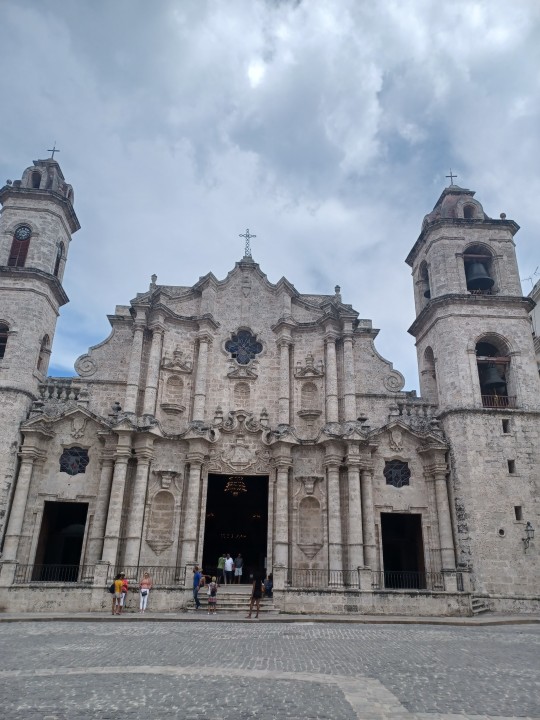

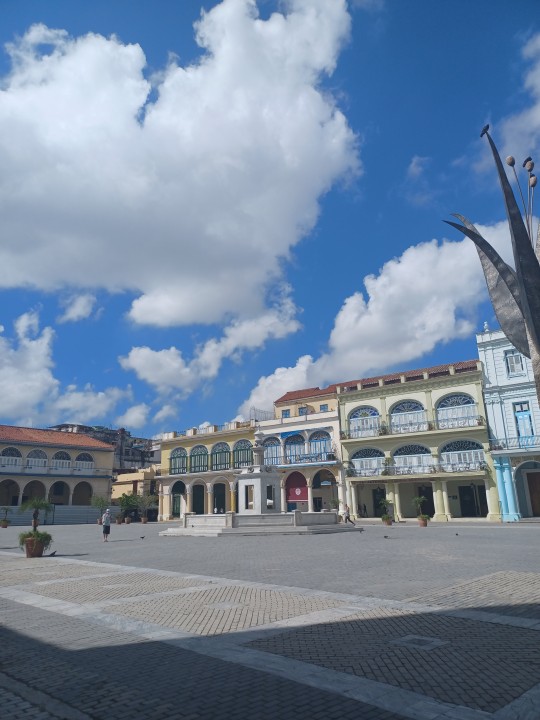

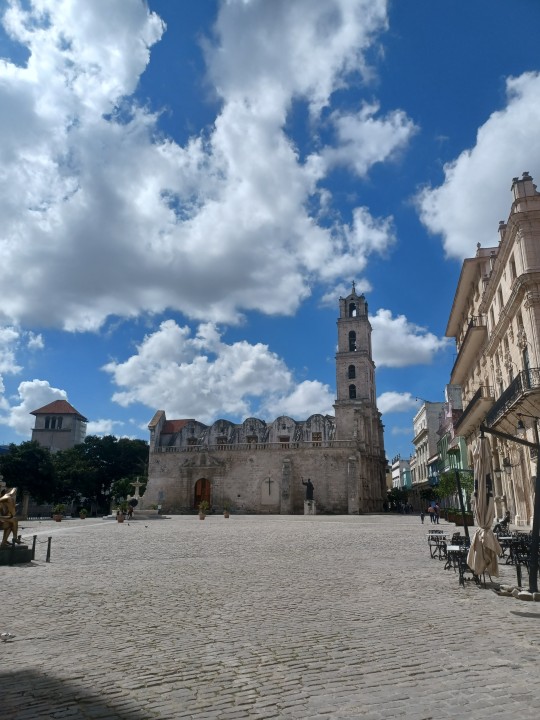
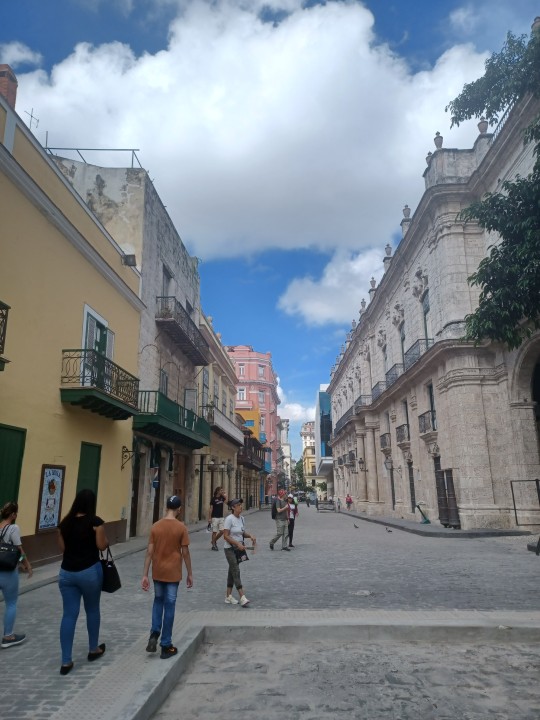
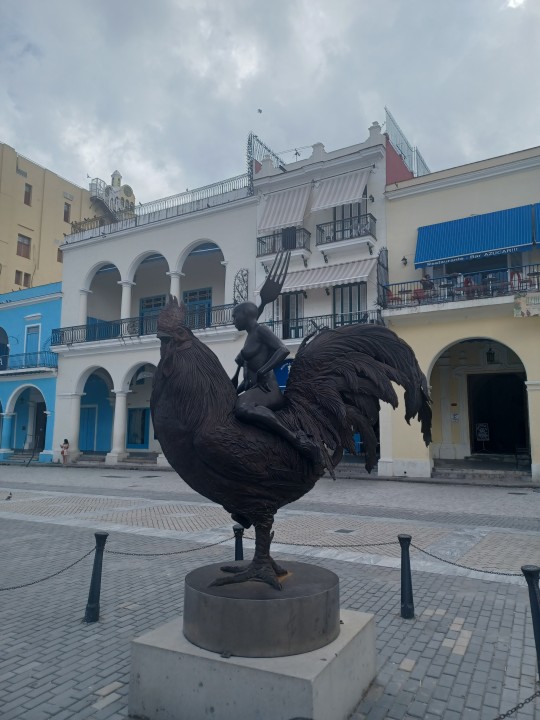
1 note
·
View note